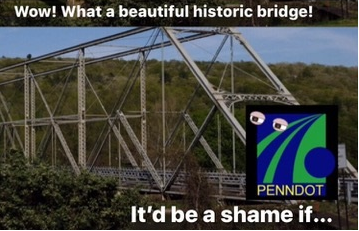Report: Gas Drilling Imperils Water
October 10, 2009Natural Gas Drilling Produces Radioactive Wastewater
November 9, 2009Environmentalist: Firms drilling for natural gas would ‘destroy’ local state game lands
By JESSICA COHEN, Community News Writer, October 09, 2009, Pocono Record
Pat Carullo’s voice bursts from the phone. He’s yelling.
“There’ll be thousands of trucks driving trough 20,000 acres of pristine woodlands for 200 gas wells!”
Mushpaugh Sportsmans Association in Lackawaxen has leased 2,500 acres of woodlands, wedged in the middle of thousands more.
For numerous reasons, Carullo, co-founder of Damascus Citizens for a Sustainable Society, is horrified. Based on the gas companies’ record at previous drilling sites, normally one tenth this size, he foresees denuded vegetation, wildlife destruction and widespread water contamination that. In other areas, that was followed by eruption of serious illnesses.
“Hickory, Pennsylvania — destroyed. Dimock, Pennsylvania — destroyed. Dimock is a poster child for destruction,” says Carullo. “The land around Mushpaugh will be an industrial zone.”
Still more distressing to Carullo, Gov. Ed Rendell and the state legislature drafted a provision in a proposed budget that would make 100,000 acres of state game land available for leasing this fiscal year of 2009 to 2010, and then 600,000 acres over two years, between 2010 and 2012, for $125 million. The area would encompass most of the state’s game land.
Resistance has emerged from both Democrats and Republicans, but the ongoing budget desperation stretching to 100 days has been bad news for the environment. Last year, 160,000 acres of game land were opened for leasing. And now Gov. Rendell has further proposed that revenue from leasing, currently designated for conservation, be reallocated to the state’s general fund.
“New York state is doing the same thing,” shouts Carullo. “Nothing’s off limits — the Catskills, the watershed. At what cost?
At what cost to tourism — our most important business? At what cost to wildlife? At what cost to our rights?”
He refers to Article I, Section 27 of the Pennsylvania constitution, which resonates in a state with an important outdoor tourism industry: “The people have a right to clean air, pure water and the preservation of the natural, scenic, historic and esthetic values of the environment. Pennsylvania’s public natural resources are the common property of all the people, including generations yet to come. As trustee of these resources, the Commonwealth shall conserve and maintain them for the benefit of all people.”
“The entire industry is intrinsically contaminating,” says Carullo. “They’re exempt from all environmental laws.”
Gas drilling procedures are largely unregulated, and Cabot, the company that leased the Mushpaugh Sportsmans Association land, has a history of damaging spills and water contamination, including, in Susquehanna County, three recent spills of 8400 gallons of hydraulic fracturing or “fracking” fluid, a secret mixture of strong chemicals used in large quantities, hundreds of millions of gallons brought in truckloads, to free gas from the Marcellus Shale deep underground.
Last week the Pennsylvania Department of Environmental Protection suspended Cabot’s operation in Susquehanna County until the company presents a pollution prevention plan and study of their fracking equipment and procedures.
But Carullo asks, incredulous, “What took them so long?”
He compares Cabot to someone allowed to keep driving after multiple citations for drunk driving, required only to go to DUI classes and AA meetings. Meanwhile Cabot continues to advertise for landholders looking for lucrative leases. Land near the Tennessee pipe line that runs through the area particularly appeals to gas drillers. And Pennsylvania has removed the Conservation District from oversight of drilling.
When Cabot resumes operation, their trucks will again be traveling the roads with heavy loads of toxic chemicals. And as Carullo points out, the road to the Mushpaugh land is the sole road running through the 20,000 acres Carullo describes as “wild and scenic.”
These 20,000 acres also include Pennsylvania game land 316 and Forest Lake Country Club’s 5,800 acres, adjacent to Woodloch Pines Resort, which Carullo says is one of few remaining successful resorts during this difficult financial period that has depleted the state’s tourism industry.
Recently the Carullos went birdwatching on the state game lands next to Mushpaugh’s leased acreage. But, he says, after the gas companies come through with their benzine and methane, “people will get out of their cars and smell rotten eggs.”



